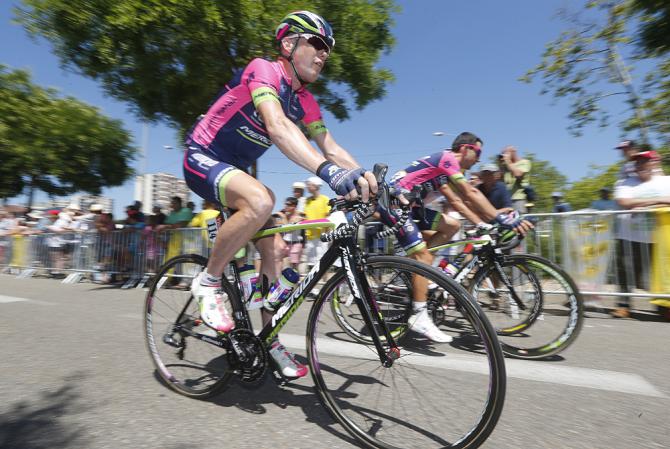Horner wasn’t healthy enough to ride Vuelta a España says MPCC president
Legeay renews call for all teams to sign up to movement’s regulations

In the wake of Lampre-Merida’s decision to pull Chris Horner from the Vuelta a España due to low cortisol levels, Mouvement Pour un Cyclisme Credible president Roger Legeay has called for all teams in the peloton to sign up to the MPCC’s more stringent regulations on the use of corticoids.
11 of the 18 WorldTour teams and 15 of the 22 teams at this year’s Vuelta are members of the MPCC, and their riders underwent additional testing on Thursday ahead of the race start in Jerez. A low level of cortisol can be indicative of corticoid use, and Lampre confirmed that Horner had obtained a therapeutic use exemption to treat bronchitis.
“He was sick, he was taking corticoids to treat his illness and the test showed that he wasn’t healthy enough to participate,” Legeay told Cyclingnews.
“Yes, we’re talking about the defending winner of the Vuelta, but the rules are the same for everybody, whether it’s a big rider or not. The MPCC is about bringing credibility to cycling, and a low cortisol level is dangerous for health, so it’s normal that a rider doesn’t start as a result of it.”
After Theo Bos twelve months ago, it is the second time in as many years that a rider has missed the Vuelta as a result of an MPCC test, while Astana also adhered to the movement’s rules when it opted not to use a cortisone-based treatment when Vincenzo Nibali was stung by a wasp during last year’s race.
Legeay hailed examples such as these – and Ag2r-La Mondiale’s voluntary withdrawal from the 2013 Critérium du Dauphiné – as evidence of the MPCC’s increasing relevance in the international peloton since its 2007 beginnings as a primarily French organisation, but seven WorldTour teams have opted not to sign up to the movement.
Sky has cited its own zero tolerance policy to hiring former dopers as a reason for its absence from the movement, and earlier this year Chris Froome won the Tour de Romandie while holding a TUE for the corticosteroid prednisolone. Movistar, BMC, Omega Pharma-QuickStep, Cannondale, Trek and Tinkoff-Saxo are also not signed up to the MPCC’s regulations.
Get The Leadout Newsletter
The latest race content, interviews, features, reviews and expert buying guides, direct to your inbox!
“2013 and 2014 have demonstrated the seriousness of the MPCC, and we would like all of the teams to sign up to our rules. I don’t want to cause a polemic and I don’t have a problem with the other teams because they are serious too, but it would be a good thing if all of the teams were following the same rules,” Legeay said.
“At this year’s Tour de France, for instance, all of the riders on the podium – Nibali, Péraud and Pinot – were from MPCC teams.”
Some of the teams who are not part of the MPCC have pointed out that the onus is on the UCI to impose rigid anti-doping rules rather than for the teams to police themselves as part of a voluntary movement.
While Legeay is keen for all teams and federations to sign up to his organisation, he agreed that the ideal scenario would be for the UCI and the World Anti-Doping Agency to add the MPCC’s regulations on cortisol – and other substances such as tramadol – to the existing anti-doping code.
“We’d like it to be part of the WADA and UCI rules, and all of the experts are in agreement that a low level of cortisol is dangerous for a rider’s health,” Legeay said. “I’ve been in meetings with WADA and the UCI about this and I know that they are taking it into consideration.”

Barry Ryan was Head of Features at Cyclingnews. He has covered professional cycling since 2010, reporting from the Tour de France, Giro d’Italia and events from Argentina to Japan. His writing has appeared in The Independent, Procycling and Cycling Plus. He is the author of The Ascent: Sean Kelly, Stephen Roche and the Rise of Irish Cycling’s Golden Generation, published by Gill Books.